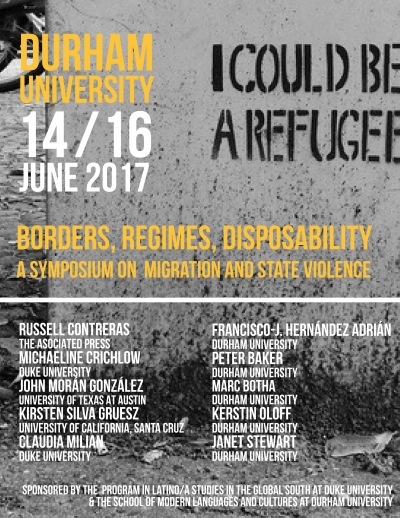
Borders, Regimes, Disposability: A Symposium on Migration and State Violence
This past summer, LSGS co-organized a workshop with the School of Modern Languages and Cultures at Durham University in the UK: Borders, Regimes, Disposability: A Symposium on Migration and State Violence. The gathering took place on 14–16 June 2017 at Durham University's Institute of Advance Study, and brought together scholars across disciplinary affiliations and different parts of the world to reflect on the currently unfolding ideological figurations of "migration" and "the migrant."
Structured as a series of 6 workshops, Borders, Regimes, Disposability interrogated the idea of borders, which despite the myriad crossings, are by too many analysts still treated as fixed and even static, and in relation only to bodies moving across “autonomous” or sovereign territories. But what of borders that exist within territories as well, mapped along imaginaries of desirable and undesirable bodies, bodies at risk and even pre-risk bodies, the latter referring to bodies already marked and mapped as transgressive and disposable? How is the figure of the migrant changing in the context of neoliberal globalization? Has the migrant become less the figure captured in the 1960s and 1970s paradigms of migration, of those moving from instability to stability or from unstable to stable regions of economic development, thereby balancing socio-economic inequalities? Might the gendered migrant be better apprehended as a fugitive fleeing from one state of crisis into another, and therefore be an expression of the generalized state of abjection and disposability? Might the contemporary conjuncture of “borders, regimes, disposability” be rehearsing a state of “history under conditions of impossibility”—a tale that exceeds the exploitation story?
The three-day academic itinerary examined the manifold movements of people and how processes of bordering are impacting and directing our own intellectual and ethical approaches to the themes and questions highlighted above. The ambition was to generate new concepts and meanings as tools of scholarly engagement with the regimes of, and responses to, contemporary global social motion.
Co-Organizers: Claudia Milian (Duke University) & Francisco-J. Hernández Adrián (Durham University).
Speakers: Peter Baker, Marc Botha, Russell Contreras, Michaeline Crichlow, John Morán González, Kirsten Silva Gruesz, Noam Leshem, Kerstin Oloff and Janet Stewart.
A complete program of the conference is available here.